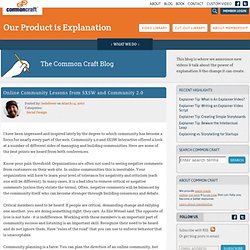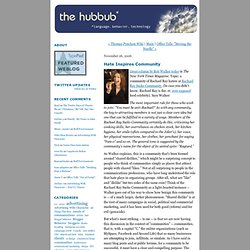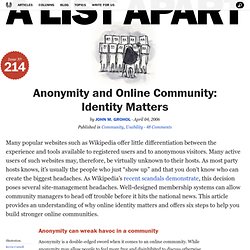

Health. Moderation. Communitybusiness. Tutorials. OpenID. Myspace - THE MOVIE! ThisNext - Recommend, Share and Discover Great Products! The Knowledge Well. Online Community Lessons from SXSW and Community 2.0. I have been impressed and inspired lately by the degree to which community has become a focus for nearly every part of the web.

Community 2.0 and SXSW Interactive offered a look at a number of different sides of managing and building communities. Here are some of the best points we heard from both conferences. Know your pain threshold: Organizations are often not used to seeing negative comments from customers on their web site. In online communities this is inevitable. Your organization will have to learn your level of tolerance for negativity and criticism (each one will be different). Critical members need to be heard: If people are critical, demanding change and rallying one another, you are doing something right: they care.
Community planning is a farce: You can plan the direction of an online community, but you'll find that the members will take it new directions that you never expected. Don't start with technology: This is true with almost any web site. Hubbub: Hate Inspires Community. Great column by Rob Walker today in The New York Times Magazine.

Topic: a community of Rachael Ray haters at Rachael Ray Sucks Community. (In case you didn't know, Rachael Ray is the, er, over-exposed food celebrity). Says Walker: The most important rule for those who wish to join: “You must be anti-Rachael!” As with any community, the key to attracting members is not just a clear core idea but one that can be fulfilled in a variety of ways. As Walker explains, this is a community that's been formed around "shared dislikes," which might be a surprising concept to people who think of communities simply as places that attract people with shared "likes.
" But what's most striking -- to me -- is that we are now having this discussion in the context of "communities" -- communities, that is, with a capital "C," the online organizations (such as MySpace, Facebook and Second Life) that so many businesses are attempting to join, infiltrate, or emulate. What Ties Do Bind? Community engagement in policing. Justcurio.us // strangers helping strangers. Anonymity and Online Community: Identity Matters. Many popular websites such as Wikipedia offer little differentiation between the experience and tools available to registered users and to anonymous visitors.

Many active users of such websites may, therefore, be virtually unknown to their hosts. As most party hosts knows, it’s usually the people who just “show up” and that you don’t know who can create the biggest headaches. As Wikipedia’s recent scandals demonstrate, this decision poses several site-management headaches. Well-designed membership systems can allow community managers to head off trouble before it hits the national news. This article provides an understanding of why online identity matters and offers six steps to help you build stronger online communities. Anonymity can wreak havoc in a community#section1 Anonymity is a double-edged sword when it comes to an online community.
Pseudonymity—anonymity that hides a person behind an online persona via a username—is common online. Freedom to the masses#section2 Summary#section7.